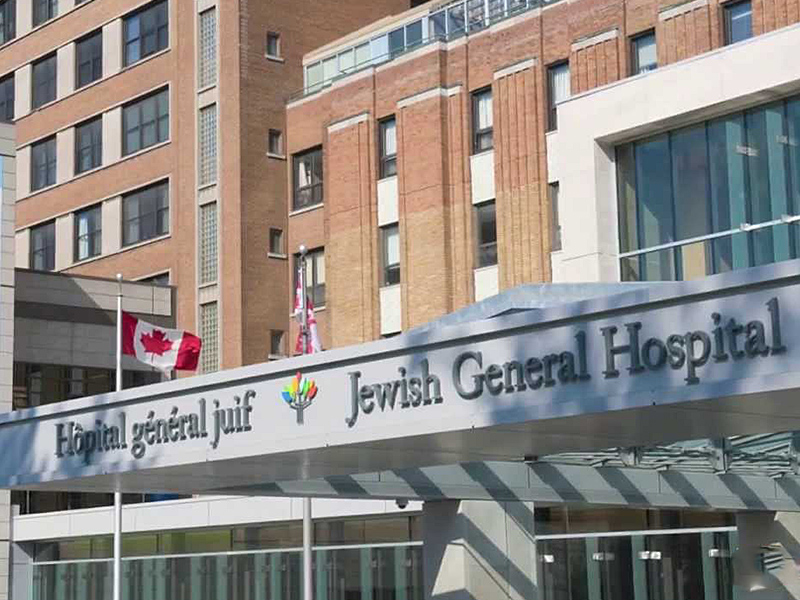Michael Goldwax is known as a bit of hard nose on the Hampstead, Que., town council, but his vulnerable side comes out when he remembers his premature firstborn’s struggle to live.
Goldwax and his wife Wendy’s son Brandon weighed just 800 g when he was born at 25 weeks at the Jewish General Hospital (JGH) in Montreal 22 years ago.
“He beat the odds. He’s thriving … and he’s taller than me,” Goldwax said at a World Prematurity Day event at the JGH on Nov. 16.
Dabbing his eyes with a tissue, Goldwax held up a Polaroid shot of the tiny boy in an incubator. “They told us he had a five per cent chance of survival,” he said, and, if he did live, he would suffer serious health problems.
READ: JEWISH GENERAL HOSPITAL GALA FETING THE AZRIELIS RAISED $1 MILLION
Yet Brandon Goldwax is now completing a degree in software engineering at Concordia University.
During his four months in the neonatal intensive care unit (NICU), parents and grandparents spent 20 out of 24 hours a day at his side, praying.
Soon after birth, he desperately needed blood transfusions. Although his father was a match, at the time, the Red Cross in Quebec did not allow direct donations. Only pleading persuaded the organization to make an exception and Goldwax made numerous trips to its facility to donate blood over a period of weeks.
The Goldwaxes were among a number of families of babies who were born prematurely but are now doing well that gathered on Nov. 16 at the JGH, which is renowned for its care in high-risk births. They came to express their gratitude for saving the lives of their infants.

“It was a shock, surreal, numbing,” Goldwax said about when Brandon came into the world so early. “There were no books to tell you what to do.”
Dr. Apostolos Papageorgiou, the JGH’s longtime chief of neonatology, and his team were “phenomenal,” said Goldwax.
“We heard a faint cry (after their son was born), before he was intubated, and then we heard nothing more. But we could see his pain, the tear in his eye,” Goldwax said, as if it happened yesterday.
At about two months, the parents got to hold their son for the first time using the “kangaroo” method of skin-to-skin contact, which is believed essential to bonding.
They told us he had a five per cent chance of survival.
– Michael Goldwax
“We did this with all the tubes and needles in place, afraid to drop this raw egg,” the father said.
Even when he finally came home, the Goldwaxes’ anxiety was not over. “We would literally watch him sleep to make sure he was still breathing,” Goldwax said. And his first seven years or so did require frequent medical follow-ups.
When he turned 18, Brandon Goldwax brought things “full circle” and donated blood for the first time at Hampstead’s annual drive, an event that his father initiated.
“Despite how busy he was, Dr. Papageorgiou came to the clinic and hugged Brandon. He said, ‘I wouldn’t miss this for world – to see my graduate here.’ ”
The World Prematurity Day event is held annually by the JGH Auxiliary, which created the Tiny Miracle Fund to raise money for life-saving equipment in the NICU.
The JGH has the best newborn survival rate in Quebec and receives transfers of ill preemies from around the province. About 700 of the approximately 4,500 deliveries each year at the JGH are premature.

Top-of-the-line incubators cost up to $65,000, while ventilators start at $50,000.
To date, the Tiny Miracle Fund has raised more than $300,000 through various projects, including from cash donations into the old incubator that sits in the hospital lobby. The goal is to raise $500,000.
The fund is chaired by Roz Rinzler, whose son, Josh, was born weighing 495 g and spent months in the NICU.
Today, at 14, he is on the honour roll of his high school, she said.
Last year, for his bar mitzvah, he started Books for Babies, a project to purchase children’s books for the NICU.
A team of auxiliary volunteers, all grandmothers, read to the NICU patients once a week. Although it seems strange to some, there is evidence the babies are soothed by the sound, and it may even contribute to their language development.
“We believe we have the best volunteer job in the hospital,” said Beatrice Lewis. “The usual reaction is disbelief. ‘Really?’ people say. But research shows that premature babies who are read to have better oxygen saturation and fewer critical incidents.
“True, some sleep through the whole thing. But others open their eyes, move their limbs or stop crying. We feel we are having an impact.”
Papageorgiou said the smallest baby the NICU saved was just 375 g at birth. That tiny former patient is now in university.






